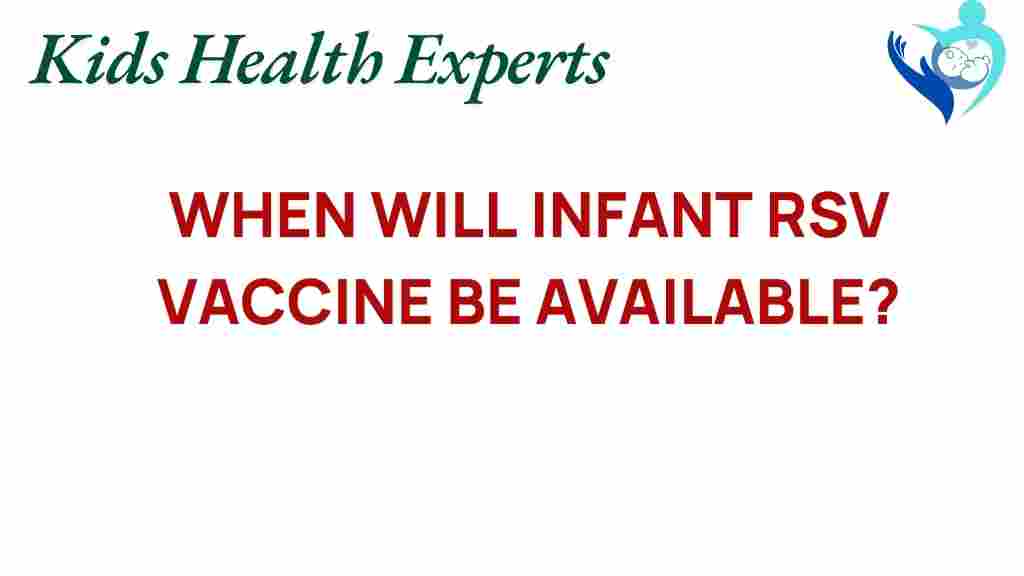The Countdown to the Infant RSV Vaccine: What You Need to Know
Respiratory syncytial virus (RSV) is a leading cause of severe respiratory illness in infants and young children. Each year, thousands of infants require hospitalization due to complications from RSV infections. As we approach the long-awaited introduction of the RSV vaccine, it is crucial for parents and caregivers to understand its significance for infant health, the impact on pediatric care, and how it fits into broader public health strategies. This article will discuss what the RSV vaccine is, its development, and what families can do to prepare.
Understanding RSV and Its Impact on Infant Health
RSV is a highly contagious virus that primarily affects the respiratory system. It is particularly dangerous for infants, especially those under six months of age, as their immune systems are still developing. Symptoms of RSV can range from mild cold-like signs to severe respiratory distress, leading to hospitalization in some cases.
The following points highlight the significance of RSV on infant health:
- RSV is the most common cause of bronchiolitis and pneumonia in children under one year of age.
- Nearly all children will have had an RSV infection by the age of two.
- Infants with underlying health conditions or premature birth are at a higher risk for severe illness.
The Development of the RSV Vaccine
Vaccine development for RSV has been a long and challenging process. Historically, attempts to create an effective vaccine faced setbacks, including issues related to safety and efficacy. However, recent advancements in vaccine technology have provided new hope.
The RSV vaccine is designed to stimulate the immune system to recognize and fight off the virus without causing the disease itself. Current research focuses on several promising candidates:
- Live attenuated vaccines: These vaccines use a weakened form of the virus.
- Subunit vaccines: These contain purified pieces of the virus to elicit an immune response.
- Monoclonal antibodies: These are laboratory-made molecules that can mimic the immune system’s ability to fight off RSV.
As of late 2023, several RSV vaccine candidates have shown promising results in clinical trials, paving the way for potential approvals.
Importance of the RSV Vaccine in Pediatric Care
The introduction of the RSV vaccine holds immense potential to revolutionize pediatric care. Here’s why:
- Reduction in hospitalizations: Vaccination can significantly decrease the number of infants requiring hospitalization due to RSV.
- Long-term health benefits: Preventing severe RSV infections can lead to better long-term respiratory health for children.
- Economic impact: Fewer hospitalizations will alleviate financial burdens on families and healthcare systems.
Prevention Strategies for Families
While the RSV vaccine represents a critical step in protecting infant health, several prevention strategies can help minimize the risk of RSV infections:
- Good hygiene practices: Regular handwashing and using hand sanitizers can reduce the spread of RSV.
- Avoiding exposure: Keep infants away from crowded places and individuals with cold-like symptoms, especially during RSV season.
- Breastfeeding: Breast milk can provide antibodies that help protect infants from infections.
For more information on childhood illnesses and preventive health measures, visit this resource.
What Parents Need to Know About the RSV Vaccine
As the RSV vaccine approaches approval, parents should be informed about its administration and effectiveness:
- Age recommendations: The vaccine will likely be recommended for infants starting at a specific age, which will be outlined by health authorities.
- Dosage schedule: Understanding the timing and number of doses required for optimal protection is crucial.
- Monitoring for side effects: Like any vaccine, the RSV vaccine may have side effects. Monitoring and reporting these to your pediatrician is important.
Step-by-Step Process for Preparing for the RSV Vaccine
Here’s a step-by-step guide for parents to prepare for the RSV vaccine once it becomes available:
- Consult your pediatrician: Schedule an appointment to discuss the RSV vaccine, its benefits, and any concerns you may have.
- Stay informed: Follow reliable health sources for updates on the RSV vaccine and its approval status.
- Vaccination schedule: Keep track of your child’s vaccination schedule to ensure timely administration.
- Educate caregivers: Ensure that anyone who cares for your infant understands the importance of the vaccine.
Troubleshooting Tips for Parents
While the introduction of the RSV vaccine is exciting, parents may have questions and concerns. Here are some troubleshooting tips:
- Q: What if my child has a cold on the vaccination day?
A: Consult your pediatrician for guidance on whether to proceed with the vaccination. - Q: What if my child experiences side effects?
A: Most side effects are mild. However, if you notice anything unusual or severe, contact your healthcare provider immediately. - Q: Can my child still get RSV after vaccination?
A: While the vaccine aims to reduce the severity of the infection, it may not completely prevent RSV. Following preventive measures remains important.
Conclusion
The countdown to the RSV vaccine for infants is an encouraging development in the fight against respiratory syncytial virus. As we prepare for its introduction, parents and caregivers must stay informed about its benefits and how to safeguard their children’s health. By understanding the importance of the RSV vaccine, implementing prevention strategies, and maintaining open communication with healthcare providers, families can significantly enhance the health and well-being of their infants.
For ongoing updates regarding the RSV vaccine and other childhood illnesses, keep an eye on reputable health organizations and local public health announcements. Together, we can work towards a healthier future for our children.
This article is in the category Vaccines and created by KidsHealthExperts Team
